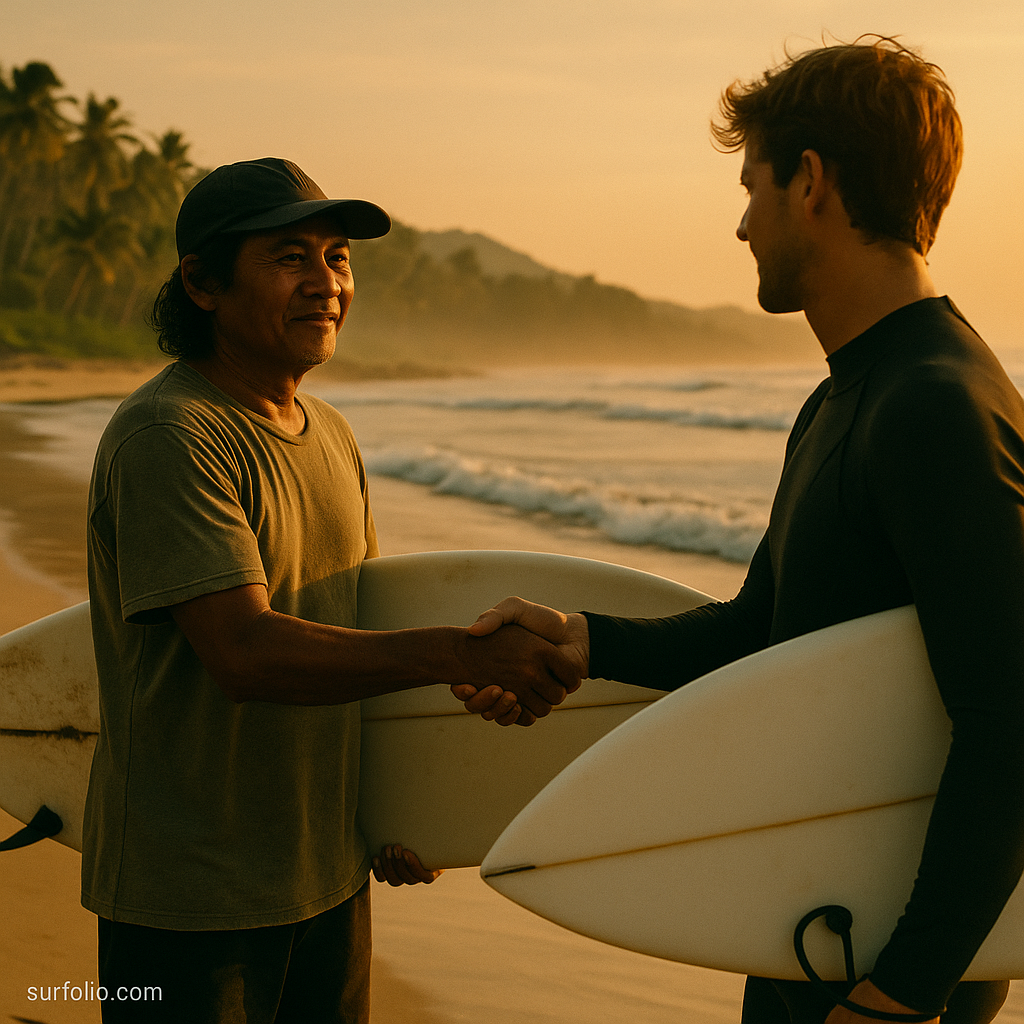
Surfing is a global language — but how it’s spoken varies from coast to coast. Every surf destination carries its own rhythm, customs, and unwritten rules shaped by the local community and culture. Whether you’re paddling out in Hawaii, Bali, or Portugal, understanding and respecting local etiquette isn’t just good manners — it’s essential to being welcomed in the lineup.
This guide explores the cultural etiquette that defines surfing around the world and how to travel as a respectful surfer, not just a visitor chasing waves.
The Spirit of Aloha: Surfing’s Origin in Hawaii
Modern surfing was born in Hawaii, where the sport is deeply tied to spiritual and cultural identity. Surfing, or heʻe nalu, wasn’t just recreation — it was a sacred practice that connected people to the ocean’s mana (life force).
Respect in Hawaii means:
- Always honoring the locals and their heritage. Surfing is part of their ancestry, not a trend.
- Never drop in on a local surfer — lineup respect here is serious and earned.
- Avoid surfing heavy local spots until you’ve observed, listened, and been welcomed.
- Learn a few Hawaiian words (mahalo, aloha, kuleana) — small gestures go a long way.
If you approach Hawaiian surf spots with humility and gratitude, you’ll find that the spirit of aloha — kindness and respect — still lives strong in the waves.
Indonesia: Balance, Patience, and Gratitude
Indonesia, with its world-famous waves like Uluwatu, Canggu, and Mentawai, is a paradise for traveling surfers. But behind its surf scene lies a deeply spiritual culture rooted in respect for nature and community.
In Indonesia:
- Always greet locals politely — a smile and “terima kasih” (thank you) go far.
- Be mindful of temples and offerings near the beach. Don’t step over them.
- Keep your volume low in the lineup; loud, aggressive energy clashes with the island’s peaceful rhythm.
- Support local surf schools and warungs (small cafés) rather than only expat-owned spots.
Above all, remember that surfing here is a gift — every perfect barrel comes from a place of local stewardship and cultural grace.
Australia: Respect the Hierarchy
Australia’s surf culture runs deep — from Gold Coast point breaks to the rugged reefs of Western Australia. While the country has a relaxed image, its lineups can be structured and competitive.
Etiquette in Australia:
- Follow the pecking order — priority goes to the surfer deepest in position.
- Don’t paddle around others; queue patiently and earn your wave.
- If you’re a beginner, stay in learner zones like Byron Bay’s The Pass or Manly Beach.
- Respect surf clubs and locals who maintain the beaches and safety patrols.
Aussie surfers value fairness and skill — show respect, surf well, and you’ll be welcomed into the rhythm of the break.
Japan: Discipline and Order in the Lineup
Japan’s surf culture mirrors its national values — discipline, politeness, and harmony. Surfers here are known for their orderliness and cleanliness, both in the water and on the beach.
Surf etiquette in Japan:
- Wait your turn — surfers rarely snake or drop in.
- Keep noise minimal and communication clear.
- Always pick up trash, even if it’s not yours. Clean beaches are a shared duty.
- Respect local parking and changing rules — some spots are near residential areas.
Japanese surf spots like Chiba, Shonan, and Miyazaki are welcoming to visitors who follow these courtesies. Surfing here feels peaceful — a quiet meditation between you, the board, and the sea.
Portugal: Tradition Meets Modern Stoke
Portugal’s coastline, stretching from Nazaré’s giant waves to the mellow beach breaks of Algarve, carries a strong surf identity. Locals are proud of their ocean heritage and deeply connected to their surf communities.
Etiquette in Portugal:
- Greet others in the water — a friendly “Bom dia” or nod goes a long way.
- Avoid crowding smaller breaks dominated by locals; spread out.
- Respect the rhythm of the lineup — locals often know the waves better and will call sets.
- Take time to learn local rules about surf zones and swimming areas.
Portugal is one of Europe’s most welcoming surf nations — as long as you respect its balance of old-school surf ethics and community warmth.
Latin America: Surfing with Soul and Community
From Costa Rica and El Salvador to Peru and Brazil, Latin America’s surf culture blends stoke, music, and hospitality. But it’s also deeply tied to community respect and environmental awareness.
To surf responsibly in Latin America:
- Always say hello before paddling out — connection matters here.
- Be aware of local surf clubs or kids’ programs; they often protect key breaks.
- Don’t litter — sustainability is a growing concern in coastal towns.
- If invited to share waves or meals, accept — community connection is part of the experience.
Latin surf culture is pure passion — warm, expressive, and welcoming to those who give the same energy back.
South Africa: Respect and Awareness
Surfing in South Africa means riding some of the planet’s most iconic waves — Jeffreys Bay, Elands Bay, and Durban. But it also means being alert and respectful of both people and environment.
Key etiquette points:
- Acknowledge lineup order — South African surfers value fairness.
- Be cautious at remote breaks — safety and local guidance are vital.
- Respect local communities and wildlife zones — many surf areas overlap with marine reserves.
- Don’t boast or act entitled; humility is valued.
Surfers here share a strong bond through challenges and respect for nature — embody that energy, and you’ll fit right in.
The Global Surf Code: Respect Is Universal
Wherever you surf, certain principles hold true — a global surf code that transcends language and geography:
- Don’t drop in — the surfer closest to the peak has priority.
- Respect the locals — you’re a guest in their home break.
- Stay humble — let your surfing speak for itself.
- Care for the environment — leave no trace, ever.
- Share waves, not aggression — surfing is joy, not competition.
Surfing responsibly means understanding that every wave you ride belongs first to the ocean, then to the community that stewards it.
Final Thoughts
Cultural etiquette in surfing isn’t about rules — it’s about respect. Every surf spot is shaped by people who’ve lived beside it, surfed it, and protected it for generations.
By approaching each lineup with humility, gratitude, and awareness, you honor not just the wave, but the culture that surrounds it. The more respect you give, the more the ocean gives back — wherever in the world you chase your next ride.
